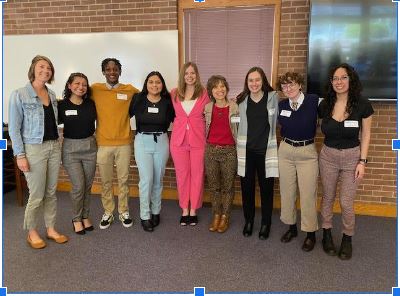Psyclone

Vol. 48 No. 2: Longest running departmental newsletter on campus. Written by students.
Greetings:
Hello everyone! We hope that this spring semester has gone well for you! Spring is slowly coming to campus, with flowers starting to bloom. We hope that you have been able to enjoy the good weather when we have it!
Your department assistants from this semester are Sarah Hochstetler and Grace Schmitt. Sarah is a Junior with a Psychology major and ASL minor. She has a cat who is almost a year old and is named Matilda after a Harry Styles song. Grace is a sophomore Psychology major and a Criminal Justice & Restorative Justice minor. Grace also plays softball for Goshen and loves to read.
Fall Semester Forum Speakers
This year we had many great speakers at the psychology forums, which occur 4 times per semester. Two of our speakers discussed their work, and how psychology may be integrated into their work. The other two forums highlighted some of our very own Psychology Majors. This gives all the students who attended the forum a new insight and understanding of how psychology may be in different areas.
At our first forum this semester we heard from three Psychology students who talked about their internship last Semester. Sarah Hochstetler did her internship at Five Little Stones, which is a small private school for children with special needs. She enjoyed being able to connect with the children and see how they progressed throughout the semester. Sarah Hinshaw’s internship was with school psychologist Brent Beck. She was able to help out with different evaluations that he did and even wrote up one of the reports herself. Lastly, Emi Garza had an internship with Ryan’s Place, which is a local organization that helps children who have experienced a death close to them. While it was a valuable experience helping to lead a group of kids, the internship helped her to realize that grief counseling is not something that she wants to go into after college.
At our second forum, Jeanette Harder shared her research into the experiences with the plains communities and their experiences with social work and adoption. There has not been any research looking into this in the past, so this is very important. She works hard to build trust with the families that she interviews and to remain respectful.
Our third forum speaker was Cheryl Shreiner who works at Greencroft. Greencroft is a local retirement community here in Goshen that provides many different services and levels of care for their residents. She shared about the importance of giving the residents as much independence as possible.

Our last forum of the year was hearing from the Psychology Research Class. Three different groups of Psychology majors presented their findings from their research this past year. Wendo Kisila and Zaira Rodriguez did research on conformity to see if students would conform during a presentation by standing and clapping at different times. Their hypothesis that people would conform was not supported, but for future research, they talked about just looking and clapping. The second group that presented was Robin Lambert and Denisse Aguilar examined relationship satisfaction differences between proximal and distal relationships. To conduct their
In the Research:
Through an international collaboration, this research may help explain why people are oftentimes affected by more than one mental health disorder. The issue comes with how the brain prunes itself of unnecessary connections. Research is finding that this pruning may be causing a wide range of mental health issues beginning in adolescence. This may help to explain why people are often affected by more than one mental health disorder. The specific mental health disorders that they were looking at were depression, anxiety, and ADHD, all which are common in adolescents.
Their research suggests that when disrupting the pruning process, it affects how brain regions talk to each other. It is mostly seen within the frontal lobes which is why it has implications on mental health. The discovery of what they call the NP factor could help to identify those adolescents that are at the greatest risk for developing mental health issues.
University of Cambridge. (2023, April 23). Problems with “pruning” brain connections linked to adolescent mental health disorders. ScienceDaily. https://www.sciencedaily.com/releases/2023/04/230424133602.htm




